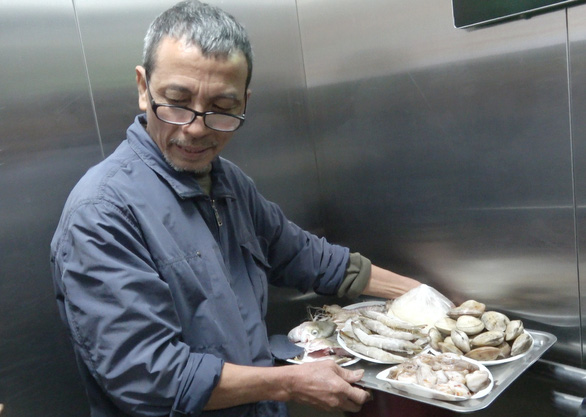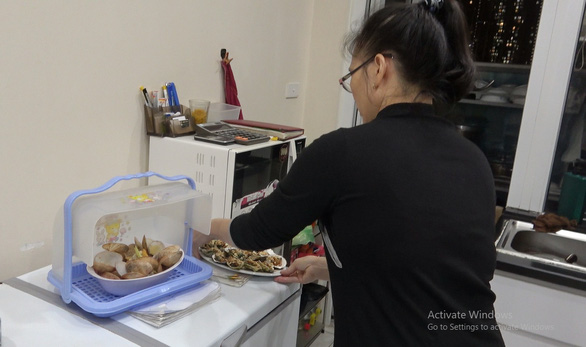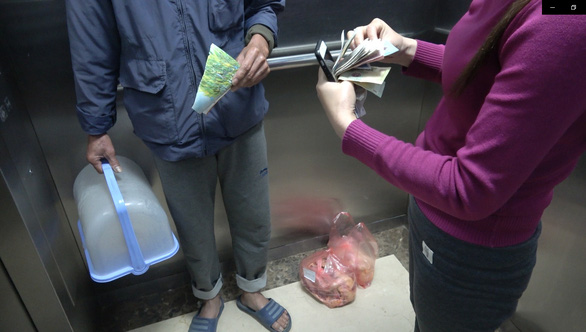Apartment-to-apartment delivery services are on the rise in Vietnam’s major cities, where residents happily buy and sell amongst themselves in lieu of shopping at traditional convenience stores.
When the elevator doors at Gemek Tower in Hanoi’s Hoai Duc District opened on the 31st floor, residents waiting on the other side were stunned at the massive amount of xoai luc lac (chopped mangoes with shrimp salt) 32-year-old Le Thi Huong was dragging from the lift.
The food had been prepared by Huong, her husband, and her younger brother, who live together in the building, and was ready to be delivered to other Gemek Tower residents.
According to Huong, apartment-to-apartment delivery services have become a popular way to cash in on the massive number of Vietnamese making the move from traditional homes into towering apartment blocks.
Huong herself sells a variety of products to her neighbors, ranging from fruits and vegetables to salted fish.
“The products vary by season,” Huong said, adding that the approaching Lunar New Year means many families are currently looking to buy traditional holiday snacks such as cashews, pumpkin seeds, and sunflower seeds.
|
|
| A woman prepares food for apartment-to-apartment delivery services. Photo: Tam Le / Tuoi Tre |
The majority of Huong’s business is done through social media platforms like Facebook and Zalo.
All prospective buyers need to do is look at what she is selling that day and send her a text or making a call.
After that, it is just a five-to-ten-minute wait before Huong’s brother or husband shows up to accept a cash payment and hand over the delivery.
Nguyen Thu Hang, a 43-year-old woman who also lives in Gemek Tower, sells veggies that she and her husband have delivered to the city each week from her hometown in the northern province of Ninh Binh.
“People are always looking for fresh greens,” Hang explained.
|
|
| An apartment-to-apartment buy and sell group on Facebook for residents of Gemek Tower in Hoai Duc District, Hanoi. Photo: Tam Le / Tuoi Tre |
Apartment-to-apartment delivery services like those offered by Huong and Hang are booming in most major apartment complexes in Hanoi and Ho Chi Minh City despite the fact that many of these complexes also house convenience stores and minimarts.
What gives entrepreneurs like Huong and Hang the upper hand, however, is speedy delivery times, high reliability, and a more diverse range of products, including clothes, cosmetics, and specialties from faraway Vietnamese localities.
The fact that a majority of the products are homegrown or homemade is also a major bonus for customers who feel strongly about understanding the origin and quality of their purchases.
Most importantly, sellers and buyers are just a few stories away if any issues arise.
“Selling products in apartments is different from trading in wet markets where sellers and buyers don’t know each other. In apartment blocks, each person knows the other’s permanent address so it’s easier to solve problems,” Pham Thi Nguyet, a 29-year-old seller in Block B2 at the Gemek Tower, explained.
|
|
| A woman pays for products delivered to her door at an apartment in Hanoi. Photo: Tam Le / Tuoi Tre |
Huge customer bases, low entry costs, and the potential for high revenues are the major factors driving the boom in apartment-to-apartment delivery services in Vietnam.
Gemek Tower, for example, consists of three apartment blocks housing approximately 1,000 families. Or, as Huong or Hang might call them, approximately 1,000 potential customers.
According to Huong, these factors are the driving force behind the VND7-10 million (US$302.5-432) in monthly profits she earns from her business.
However, as competition grows, so does the need to ensure quality and customer service.
“More sellers mean more requirements to serve high quality products that meet the needs of customers. We also need to make sure to keep a polite attitude while we do business,” Nguyet said.
Like us on Facebook or follow us on Twitter to get the latest news about Vietnam!




















































